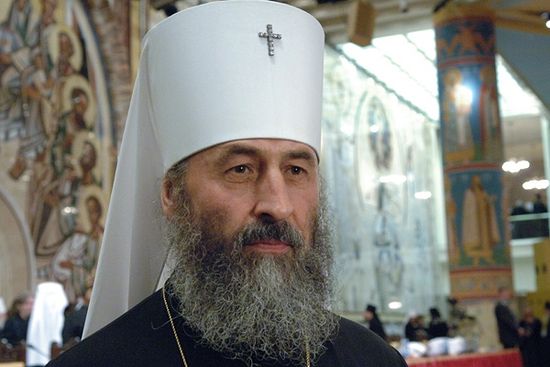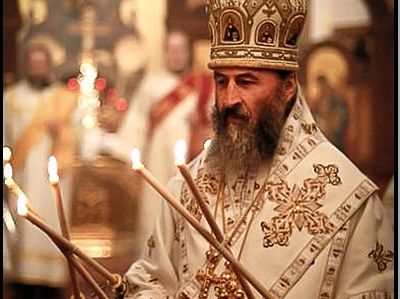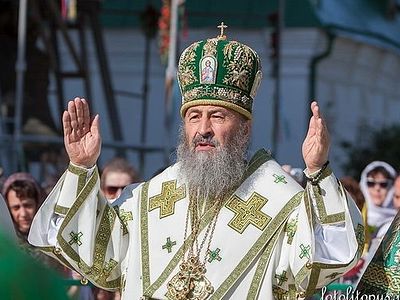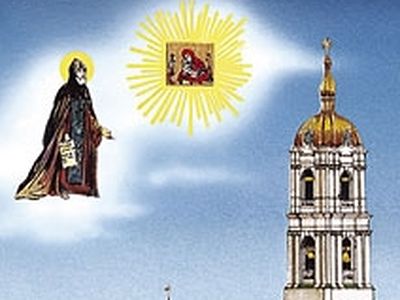Source: Religious Information Service of Ukraine
February 4, 2016
On February 2, the Bishops' Council of the Russian Orthodox Church was held in Moscow. The second speaker after Patriarch Kirill was the head of the Ukrainian Orthodox Church (Moscow Patriarchate) Metropolitan Onufriy, Religion in Ukraine reports, citing Patriarchia.ru.
Developing the theme of the persecution of the Ukrainian Orthodox Church in Ukraine, raised by the head of the Russian Orthodox Church in the first report, Metropolitan Onufriy confirmed: “During the past two years the Lord deigned us, the faithful of the Ukrainian Orthodox Church, a great honor, to participate in suffering for loyalty to His holy laws.”
At the same time, he said: “Our Ukrainian Orthodox Church together with all the people of Ukraine shares today the hardships and sorrows that fell to our lot. We diligently pray that God would send to our land lasting peace and save us all from temptations.”
Assessing the ministry of the previous head of the UOC as “a true shepherd of Christ and a true patriot,” the speaker noted “a marked quantitative growth of the Ukrainian Orthodox Church” in the period since the death of Metropolitan Volodymyr (Slobodan).
Thus, “the total number of parishes at the beginning of 2016 was 11,949. 11,976 clerics serve there, including 11,037 priests and 939 deacons. In Ukraine there are 247 monasteries (including 129 men’s and 118 women’s), where 1,603 monks and 2,515 nuns bear obedience. The number of hieromonks is 888, and 303 hierodeacons.”
His Beatitude Onufriy called “an important challenge” for the UOC the problem of pastoral care for the Ukrainian diaspora and members of diplomatic missions of Ukraine abroad. Metropolitan Onufriy called for "pay[ing] special attention to this problem,” so that Ukrainian migrants would not go to the Ukrainian Greek Catholic Church or the Ukrainian Orthodox Church-Kyiv Patriarchate, given the fact that the UOC “repeatedly put forth the initiative to develop a more effective mechanism for pastoral care in the Ukrainian diaspora.”
Metropolitan Onufriy presented details of peacemaking and charitable activities of the UOC from the beginning of the protests during Euromaidan up to the present, lamenting that, despite these facts, the media “regularly publish reports denigrating the Ukrainian Orthodox Church.”
The head of the Ukrainian Orthodox Church also noted the repeated appeals to “all the faithful of our Church,” to Patriarch Kirill and to Russian President Vladimir Putin not to allow bloodshed in Ukraine and to raise their voice for the preservation of the territorial integrity of the Ukrainian state.
Today, as a result of fighting on the territory of the dioceses in Donetsk and Luhansk regions, 9 churches have been destroyed, 77 churches have been damaged, and three clergymen have been killed.
Metropolitan Onufriy said that “in a situation of continued military confrontation in eastern Ukraine, we emphasize that we unfailingly stand on the side of peace and support all peace initiatives of the Ukrainian authorities.”
He also listed a number of positive trends in the development of Church-state relations in Ukraine under the new government. However, he referred to the parliamentary bill on labor law, which provides for the notions of “sexual orientation” and “gender identity” as presenting a serious concern.
Metropolitan Onufriy also called “challenging” the relations with local authorities, as well as with non-canonical denominations in different regions of Ukraine. Thus, “in 2014-2015, 31 seizures of temples of the Ukrainian Orthodox Church were registered, 8 more religious communities have voluntarily changed their jurisdiction and passed to the so-called 'Kiev Patriarchate.' In 12 towns today, the threat of power seizure of churches remains. The situation remains especially tense in the Volyn, Lviv, Rivne, Ternopil and Chernivtsi dioceses."
In such a situation “dialogue with those who remain today in schism is hardly possible,” the head of the UOC (MP) said.




